Sometimes a specific episode of a television show comes along and causes us to sit back in satisfied awe at the wonder we have witnessed. These are the episodes we refer to as classic without any trace of hyperbole. Doctor Who’s “Heaven Sent” is one such episode.
THE SERIES: Doctor Who
THE EPISODE: “Heaven Sent” (Season 9, Episode 11)
THE PREMISE:
It may seem premature to call an episode that aired less than a month ago a show’s high water mark, but I feel confident when I apply such a label to Doctor Who’s “Heaven Sent.” It is remarkable that a show that has been on the air for as long as Doctor Who has can still create an episode that feels so remarkably esoteric and innovative. I’ve written before about whether or not the show can really be called children’s programming, but “Heaven Sent” is as grim and tragic as the best of more “adult” sci-fi.
(SPOILERS AHEAD FOR “HEAVEN SENT” + THE EPISODES WHICH BOOKEND IT, “FACE THE RAVEN” & “HELL BENT”)
THE PLOT:
Plot-wise, this is both one of the simplest and most difficult episodes to describe. It’s a glorified bottle episode focusing solely on the Doctor (Peter Capaldi), picking up directly after the show’s prior episode “Face the Raven” ended with Clara (Jenna Coleman) dying and the Doctor transported to an unknown location.
By the end, we’ll see how true the above statement really is. Alone in a mysterious castle, the Doctor encounters a creature known as The Veil, which looks like an image that frightened him as a child. He runs away from the creature until he solves the puzzle at hand and escapes.
That doesn’t sound so hard, right? Come on. Nothing’s ever that easy for the Doctor. As written by Doctor Who Executive Producer Steven Moffat, “Heaven Sent” drops the Doctor squarely in the middle of a ingeniously constructed time loop (that’s not technically a time loop), making this a classic twisty episode of sci-fi TV which demands repeat viewing.
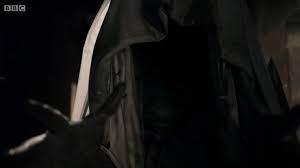
He comes to realize that The Veil is slowly, but doggedly, pursuing him. The only things that will stop it are confessions that he has never uttered aloud. Whenever he makes a confession to the creature, it stops and the walls around the castle shift and open into new rooms. Eventually, he discovers the means of his escape may be in Room 12.
Along the way, he sees aspects of the castle that only add to its mystery—an aging portrait of Clara, a replacement set of clothes left for him after he jumps into the encompassing ocean, an endless array of skulls adorning the ocean floor, the stars that look like they’re in the wrong places in the sky (To the Doctor, it looks like he’s traveled about 7,000 years into the future, but he can feel time travel. So, he knows he hasn’t.), rooms that reset when he leaves them, and the word “bird” scratched into sand.
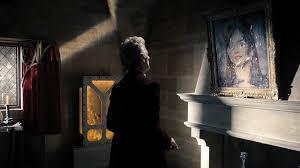
He has time to eat, sleep, and strategize, but The Veil is always pursuing him. Its point of view remains projected on the various security cameras covering the walls. Slowly, both the audience and The Veil hear the Doctor’s confessions: 1) Despite always laughing in the face of danger, he’s actually afraid to die; 2) He ran from his home planet out of fear, not boredom; 3) He knows who and what a creature known as The Hybrid is (a mythical prophecy about a cross-fertilization of two warrior races into the ultimate warrior). The Doctor comes to realize he will remain imprisoned until he reveals what he knows about The Hybrid.
Eventually, the Doctor makes his way to Room 12. There he sees a wall made of a material harder than diamonds, with the word “Home” briefly appearing and disappearing across the top. Escape means breaking through that wall.
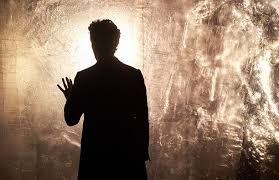
He begins to strike the wall, wincing in pain with each blow, recounting a Brothers Grimm tale about the nature of eternity, as The Veil approaches, enwraps its arms around his face, and fatally burns him. Alone and dying, the Doctor drags himself up the stairs, back to the room with the teleportation device where he initially arrived.
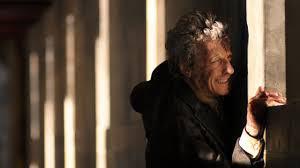
With that, he scrawls “bird” into the sand, burns himself to ashes, the new copy of the Doctor steps out of the teleport and a montage of the events we’ve seen repeat themselves, always ending with the Doctor saying the stars appear as though they’re farther and farther into the future, the exact number of years beginning in the thousands (when we first see him, as we meet him well into this Kafka-esque cycle) and ending in the billions. He continues to punch and chip away at the wall, each time getting a little bit further into the story about the nature of eternity, getting burned by The Veil, burning himself to ashes, and a new copy emerging.
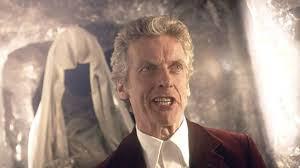
Along the way, we hear more and more of his anecdote about a shepherd’s boy who was asked how to measure eternity. The boy responds with a story of a hypothetical bird that, every 100 years, sharpens his beak on a diamond mountain. Once the mountain is completely chiseled away, the “first second of eternity will have passed.” The Doctor finishes the anecdote the moment that he finally manages to punch a hole through the wall, a triumphant moment he punctuates by proclaiming, “You may think that’s a Hell of a long time. Personally, I think that’s a Hell of a bird.”
Stepping out of his prison, he sees he’s back on his home planet, Gallifrey, and he realizes they are the ones who trapped him for information. Looking as though he’s beyond mere words like “wrath” and “fury,” he reveals the secret he wouldn’t reveal in the prison: “The hybrid is me.”
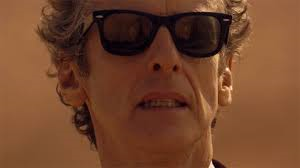
This episode had been hyped for weeks before it aired as “the episode with the Doctor on his own” and how amazing such an experiment would be. The fact that it managed to live up to that hype is a true testament to its quality. The praises of Peter Capaldi, writer Steven Moffat, and director Rachel Talalay cannot be sung enough. While it could feel stagey and dull to feature only one character for much of its extended running time, this show has an advantage over most others: the Doctor already kind of talks to himself anyway. This character is a pretty natural fit for such an experiment.
Technically, this is the middle chapter in a television three-parter. All three of these episodes tell such complete stories that they can be seen and appreciated on their own, but this episode is on a whole new level of brilliance. It features a fabulously dark twist, yet what makes the twist so effective is that it doesn’t come out of nowhere. It is conceivable that the ultimate solution could be worked out by a viewer in advance, but that would in no way lessens the episode’s impact. This episode is not about the twist, it’s about the Doctor as a character.
The Doctor may be the show’s titular character, but he is almost exclusively seen through the eyes of his companion. She’s always our “in” to the character. The Doctor is usually presented as an individual who thinks beyond what we can comprehend. You can like the Doctor, but actually identifying with him is trickier. Here, however, we see a Doctor who is on his own and grieving. A solo adventure grants an audience access to the way he works through scenarios. Early in the episode, he finds himself in a room, staring at Clara’s portrait. He takes a flower out of a vase and examines the portrait with a makeshift monocular. The Veil enters the room and traps him. He drops the flower, drops the monocular, throws a stool out of the window, and jumps after it into the water. As he falls, we go into his mind palace, as he talks to “Clara” about all the planning and strategy that went into testing whether or not he could survive that fall, and every action was providing evidence as to whether or not jumping out of that window was a strategy that could ensure his survival. He may always assume he’s going to win, but he does so because he is an excellent strategist. This peek into the Doctor’s psyche would be enough for me to recommend the episode, but what really makes it work is when it explores the emotional side of the Doctor’s character.
Let’s take, for example, the moment when he faces the impenetrable wall and realizes the full meaning of the word “bird” scrawled into the sand. He flashes back to his mind palace, and we see him raging in a way this Doctor rarely does. He screams, begs the Clara in his mind to let him lose just this once, but she continues to confront him with that one simple question: “How are you going to win?” That’s when it hits him. He can give in, tell his captors about The Hybrid or he can do what he’s done every time he’s reached this point before. Clara is gone and that grief is still raw and unassuaged, and it breaks him right then and there.
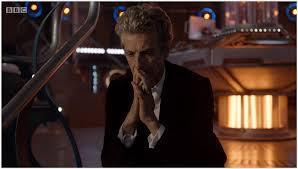
Capaldi is a remarkably restrained actor and his Doctor does not wear his emotions on his sleeve the way his predecessors did. When his anger or his grief hits, it’s thrilling, because it is so rarely seen. It’s always only at this point that he can remember every time he’s been standing right there in front of that wall, knowing what he’s been doing, knowing how far away he is from breaking through, knowing he’s going to be caught and killed, but also knowing this is going to happen over and over again for an unforeseeably long amount of time. Clara gives him the strength he needs to continue. He fights, because the only other option is to lose.
He will go through this renewal of his grief over losing Clara and his anger over the terrible ordeal into which he’s been trapped every time he comes back to this point. It’s not just the physical pain from continually striking that wall or crawling up those stairs to his death when he’s too mortally wounded to continue. It’s the emotional trauma that’s going to be renewed over and over in a near-infinite loop. He may stay in his prison for billions of years, but his grief will not heal because he can’t feel that time. It’s like the grimmest Groundhog Day imaginable. The next episode presents a Doctor broken and traumatized, who still can’t quite believe that his own people put him through this, but that trauma is present here too. The viewer can see this ordeal is pushing him well past his breaking point. It’s brutal, heartbreaking, and harder on a central character than one should ever expect from a children’s show.
There are so many stand-out moments from Capaldi here, that it’s hard to pick just one. But if I had to choose, I’d nominate the moment in his mind palace when, near death, he despairingly asks how much longer he can keep “burning the old [him] to make a new one?” It’s practically a commentary on what regeneration must feel like, and it is devastating. The Doctor questions whether or not he may be in Hell (He’s not worried. After all, “Hell is just Heaven for bad people.”). But this is a Hell that is beyond anything he could have comprehended.
Despite Clara not really being in this episode, her presence is critical to making the story work. There has sometimes been a criticism thrown at Doctor Who that claims the companion is really only there to ask the questions the audience needs asked and to be a pawn that can be captured and used as an antagonist’s leverage. At first, the episode would almost seem to uphold the first part of that claim, as the Doctor is using her memory to ask the questions for which his mind needs answers and bounce ideas off of her without ever giving her a response. Nonetheless, this episode presents the real reason the Doctor needs a companion. He wants to give up, he’d rather just stop and wallow in grief, but he finds solace in the Clara’s form.
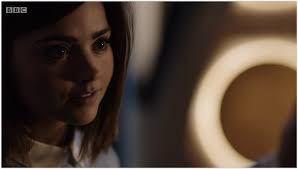
She encourages him to break free and win. It may just be his mental image of her, but that’s what he needs, and it’s telling that his mind retains her form for that purpose. Clara as a character took a bit of time to come into focus, but her relationship with Capaldi’s Doctor was an epic, platonic bond. The companion is ultimately the Doctor’s better half, and he will fight for her when he’d rather submit.
This episode could allow itself to be overshadowed by its narrative twist, but it allows the Doctor to grieve and process what Clara’s loss actually means for him. It haunts him as a companion’s death would, but particularly the death of a companion for whom he cared as deeply as he did for Clara. In the next episode, their bond becomes even more tragically apparent, as the Doctor reveals he only went through billions of years of torture for the chance to resurrect her. At the end of that episode, it’s doubly heartbreaking, because he ultimately cannot really save her. After seeing what he went through to do so, that is a truly horrifying revelation. Despite his threats as to what he may be capable of now with his companion no longer beside him, it’s lovely that he emerges as the man Clara always believed him to be. He’s determined to win when it would be so much easier to lose.
The episode ends with a promise of vengeance for the planet he once fought to save, and who rewarded him with an eternity in a torture chamber for his efforts. He may be home, but he took the long way round, and he may not be the better for it.
Check out the trailer for the episode below:
Seasons 1-8 of Doctor Who can be streamed on Netflix. Season 9 can be purchased through streaming services.
So, what do you think? Were you a fan of this episode? Is there one you think is better? Let us know in the comments!

